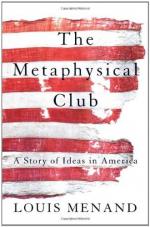
|
| Name: _________________________ | Period: ___________________ |
This test consists of 5 multiple choice questions, 5 short answer questions, and 10 short essay questions.
Multiple Choice Questions
1. William James believed that people have beliefs because the object of belief has been shown to have _________.
(a) Consequences.
(b) Colors.
(c) Purpose.
(d) Value.
2. _________ wrote a book called 'The Will to Believe' and dedicated it to Charles Pierce.
(a) Charles Pierce's brother.
(b) John Dewey .
(c) Oliver Wendell Holmes.
(d) William James.
3. __________ is the idea that people come at life from different places, and understand the world in different ways.
(a) Separatism.
(b) Pluralism.
(c) Singularism.
(d) Individualism.
4. Dewey had a different take on stimulus and response that stated _________.
(a) They were difficult concepts.
(b) They needed to be studied separately.
(c) They were dependent on each other.
(d) They were not necessary for studying behavior.
5. Randolph Bourne believed his purpose in life was to find the ____________ in other people's theories and philosophies.
(a) Documentation.
(b) Benefits.
(c) Problems.
(d) Angles.
Short Answer Questions
1. Daniel Gillman, the first president of Johns Hopkins wanted ________ to teach philosophy at the school.
2. Holmes argued that judges used __________ and then find precedents to explain their decisions.
3. The first president of the University of Chicago was_________.
4. Pierce also believed that humans get their ideas of right and wrong from __________.
5. Pierce used __________ daily because of the pain caused by cancer that ravaged his body.
Short Essay Questions
1. What did Dewey do after leaving the University of Michigan at the age of thirty-five?
2. What are modern societies led by, according to the studies of Holmes?
3. What did Pierce have to do because of the cancer that ravaged his body in his later years?
4. What was the greatest achievement of Holmes which occurred before he was 40 years old?
5. What was happened that made it difficult for Dewey to get into Chicago to start his new job?
6. What did Morris allow Dewey to do as he was his star pupil and eventually good friend?
7. What was the new requirement of all students who enrolled in Harvard Professional Schools?
8. Why was Cattell fired from Columbia University with the start of WWI?
9. Why did Kallen give up his religion at first, though he ended up returning later on?
10. What did Randolph Bourne believe his purpose in life was, according to this book?
|
This section contains 565 words (approx. 2 pages at 300 words per page) |

|




